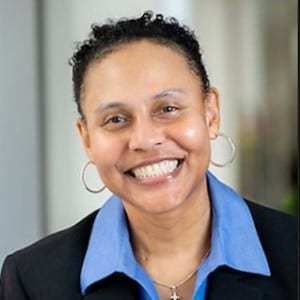
After months of delay, King County’s Regional Homelessness Authority was supposed to get its Chief Executive Officer. There’s just one problem. The consensus pick, Regina Cannon, has turned down the job, Scott Greenstone reported in The Seattle Times yesterday. The reason Cannon declined the job isn’t yet known; the Atlanta-based homelessness and equity consultant has declined to comment thus far.
The agency CEO would oversee an annual budget of $132 million and have the tall task of bringing together key decisionmakers around the region to agree about homelessness policy. The ongoing vacancy leaves the authority rudderless and our regional response to homelessness adrift–without a CEO, the authority’s staff positions are also vacant.
Back on February 4th, Mayor Jenny Durkan had heralded the hiring decision: “Today we’ve reached a critical milestone in our efforts to address the humanitarian crisis facing our region. With the unanimous selection of Regina Cannon as the new King County Regional Homelessness Authority CEO we demonstrated the ability to come together to address one of our most challenging issues.”
Durkan praised Cannon’s experience saying “her strong background in equitable housing and supportive services, and the intersection with racial equity are huge assets.” The homeless crisis undoubtedly is racialized; Black and Indigenous people have born the brunt of the crisis, and are vastly overrepresented in homeless populations.

Seattle has been in a declared civil emergency on homelessness for six years. The 2020 point-in-time count found 11,751 people experiencing homelessness in King County, nearly half of them unsheltered. Homelessness has stayed stubbornly high despite the declared emergency.
Views on how to address homelessness run the gambit, with some suburban leaders committed to punitive approaches (as opposed to evidence-based ones) and swayed by conservative anti-homeless propaganda like KOMO’s Seattle Is Dying and Fight for The Soul of Seattle “documentary” specials. Some suburban cities and neighborhoods pushback vigorously to the prospect of hosting shelters and permanent supportive housing. Eight cities including Renton, Kent, and Bellevue opted out of a County tax aiming at funding the conversion of motels into permanent supportive housing for homeless people.
Last week, the Mercer Island City Council passed an ordinance attempting to ban people experiencing homelessness from the island. A Ninth Court of Appeals ruling (Martin v. Boise) has established that cities can’t sweep people experiencing homelessness unless they have adequate shelter space to offer. True to its snooty brand, Mercer Island doesn’t have a shelter but is attempting to circumvent the ruling by reserving shelter space in neighboring cities, Publicola‘s Erica C. Barnett reported.
“The four shelters to which Mercer Island plans to send people caught sleeping outdoors are far away, small, crowded (a particular concern during the ongoing pandemic), high-barrier, and often full; any of these factors could be used as an argument that the shelter isn’t really ‘available’ or acceptable for a particular person,” Barnett wrote. “The Ninth Circuit ‘made pretty clear that you can’t, for example, force somebody to adhere to a religious doctrine or practice a religion to access a shelter,’ or be ‘clean and sober,’ [ACLU Washington’s Breanne] Schuster said.”
In such an environment, leading the homelessness authority is likely to be a taxing, thankless job lacking a clear path to success–not exactly a combination likely to entice a candidate to uproot her life and move across country–even if it’s for a high profile job with $200,000 salary.
It’s been about a year since the CEO search began. The authority’s governing board had hoped to make its CEO hire by September, but now they’re scrambling to get Plan B together. “County staff are contacting members of the authority’s implementation board to find a time to reconvene and determine next steps,” Greenstone said.
The Regional Homelessness Authority CEO–whoever that ends up being–is in a more difficult proposition as suburban cities increasingly rebel against the vision of shared responsibility on which the plan was launched. To make matters worse, the authority’s founding structure was toothless, with no means to raise funds from suburban cities or force policy changes.
Giving suburban cities more votes than Seattle, which provides the majority of the authority’s funding and provides most of the region’s shelter space and social housing, may end up dooming the effort, or at least throwing up extra obstacles. On the other hand, getting the suburbs to buy into the vision of a compassionate evidence-based response centered on supportive housing is likely a hurdle that ultimately will need to be cleared to finally end the homelessness crisis in the region.
The search for a leader to spearhead that effort continues. One name out there was a runner up in the earlier executive search: Marc Dones, director of the consulting firm National Innovation Service. Dones was also rumored to be a leading candidate to staff the Mayor’s Equitable Communities Task Force.
“Although she voted for Cannon, Seattle Mayor Jenny Durkan was the only governing committee member to mention and commend Dones during the vote to select Cannon,” Greenstone reported. “However, when asked if she now supports Dones for CEO, the mayor’s office didn’t answer specifically.”
This article has been updated with the quote from Mayor Durkan and to remove incorrect pronoun for Marc Dones, who uses they/them pronouns.
Doug Trumm is publisher of The Urbanist. An Urbanist writer since 2015, he dreams of pedestrian streets, bus lanes, and a mass-timber building spree to end our housing crisis. He graduated from the Evans School of Public Policy and Governance at the University of Washington in 2019. He lives in Seattle's Fremont neighborhood and loves to explore the city by foot and by bike.


